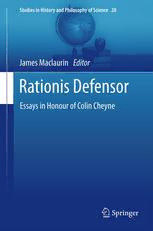Table Of ContentRationis Defensor
STUDIES IN HISTORY
AND PHILOSOPHY OF SCIENCE
VOLUME28
General Editor:
STEPHEN GAUKROGER, University of Sydney
Editorial Advisory Board:
RACHEL ANKENY, University of Adelaide
PETER ANSTEY, University of Otago
STEVEN FRENCH, University of Leeds
KOEN VERMEIR, Katholieke Universiteit, Leuven
OFER GAL, University of Sydney
JOHN SCHUSTER, University of New South Wales
RICHARD YEO, Griffith University
Forother titles published in thisseries,goto
http://www.springer.com/series/5671
James Maclaurin
Editor
Rationis Defensor
Essays in Honour of Colin Cheyne
Editor
JamesMaclaurin
DepartmentofPhilosophy
UniversityofOtago
364LeithWalk
Dunedin,NewZealand
ISSN0929-6425
ISBN978-94-007-3982-6 ISBN978-94-007-3983-3(eBook)
DOI10.1007/978-94-007-3983-3
SpringerDordrechtHeidelbergNewYorkLondon
LibraryofCongressControlNumber:2012935858
#SpringerScience+BusinessMediaB.V.2012
Thisworkissubjecttocopyright.AllrightsarereservedbythePublisher,whetherthewholeorpartof
the material is concerned, specifically the rights of translation, reprinting, reuse of illustrations,
recitation,broadcasting,reproductiononmicrofilmsorinanyotherphysicalway,andtransmissionor
informationstorageandretrieval,electronicadaptation,computersoftware,orbysimilarordissimilar
methodologynowknownorhereafterdeveloped.Exemptedfromthislegalreservationarebriefexcerpts
inconnectionwithreviewsorscholarlyanalysisormaterialsuppliedspecificallyforthepurposeofbeing
enteredandexecutedonacomputersystem,forexclusiveusebythepurchaserofthework.Duplication
ofthispublicationorpartsthereofispermittedonlyundertheprovisionsoftheCopyrightLawofthe
Publisher’s location, in its current version, and permission for use must always be obtained from
Springer.PermissionsforusemaybeobtainedthroughRightsLinkattheCopyrightClearanceCenter.
ViolationsareliabletoprosecutionundertherespectiveCopyrightLaw.
The use of general descriptive names, registered names, trademarks, service marks, etc. in this
publicationdoesnotimply,evenintheabsenceofaspecificstatement,thatsuchnamesareexempt
fromtherelevantprotectivelawsandregulationsandthereforefreeforgeneraluse.
While the advice and information in this book are believed to be true and accurate at the date of
publication,neithertheauthorsnortheeditorsnorthepublishercanacceptanylegalresponsibilityfor
anyerrorsoromissionsthatmaybemade.Thepublishermakesnowarranty,expressorimplied,with
respecttothematerialcontainedherein.
Printedonacid-freepaper
SpringerispartofSpringerScience+BusinessMedia(www.springer.com)
For Colin and Liz
Foreword
“Askamathematicianwhethertherearenumbersbiggerthan100,andhewillsay
‘Of course there are’. Ask a mathematician whether numbers exist, and he will
wonderwhatyouaretalkingabout”.SoColinCheyneoncesaidtome,shortlyafter
hewasfirstbittenbythephilosophybug.
That happened to him later in life than most who are so bitten. Colin’s first
career was in mathematics and as a High School teacher of mathematics, both in
New Zealand and in the UK. Then, in the 1980s, he returned to the University of
Otago as a part-time student of philosophy in general and of mathematical logic
inparticular.Histalentforphilosophysoonbecameapparent.HecompletedhisBA
and a Postgraduate Diploma in Philosophy, and embarked upon his PhD in 1990.
By that time he had abandoned his career as a High School teacher to join the
Philosophy Department, where he was appointed first as a Teaching Fellow and
thenaLecturer.
Colin completed a stunning doctoral thesis in 1994. It formed the basis of his
majorpublication,Knowledge,Cause,andAbstractObjects:CausalObjectionsto
Platonism,whichappearedin2001.Asitstitlesuggests,itreturnstothepuzzlewith
whichIbegan.Donumbersexist,andiftheydo,whatkindofthingarethey?Colin
wasskepticalaboutthePlatonistviewthatnumbersareabstractobjectsthatdonot
existinspaceortimeanddonotdoanything.Hewasskepticalaboutthis,aboveall,
because it makes it wholly mysterious how mathematical knowledge is possible,
how we can know anything about numbers so conceived. He claims that we can
knowoftheexistenceofanobjectonlyifwecansomehowcausallyinteractwithit,
however remotely. And he argues that numbers and other abstract (a-causal and
non-spatio-temporal)objectsfailthistest.
Theseanti-PlatonistviewswereatoddswiththeviewsofColin’smainteacher
inmathematicallogic,thelatePavelTichy´,whowasaresolutePlatonistregarding
mathematicalandlogicalobjects.Tichy´’stragicdeathin1994leftagapingholein
theteachingresourcesofthePhilosophyDepartmentforaspecialistlogician.Who
bettertofillthatgapthanColinCheyne,whohadexcelledinthatarea?Accordingly
ColinwasappointedchieflytotakeoverTichy´’sseriesofhigh-poweredmathemati-
cal logic courses. This he did for nearly 20 years. His philosophical disagreements
vii
viii Foreword
withTichy´ didnotpreventhimfromteachinglogicthe‘Tichy´ way’.Nordidthey
preventhimfromco-editingtheposthumouspublicationofPavelTichy´’sCollected
Papers inLogic and Philosophy, which appeared in 2004. This work brought him
into contact with Tichy´’s former colleagues and disciples in the Czech Republic,
andhebecamearegularparticipantinlogicconferencesheldthere.
Colin’seditoriallaboursonbehalfofhiscolleaguesdidnotendthere.In2006he
co-editedRationalityandReality:ConversationswithAlanMusgrave,aFestschrift
tomarkmyownretirementfromthePhilosophyDepartment.Thevolumeprovedto
bealittlepremature–orasColinputit,“thisretirementtheorywasrefuted”.
Meanwhile, Colin’s own work blossomed. He was a demanding and rigorous
teacher.Mostofourmosttalentedstudentspassedthroughhishandsandbenefitted
fromhislogiccourses.Oneofthemosttalentedofthemalloncecomplainedtome
that“grumpyColin”hadfoundmistakesinherlatestlogicexerciseandhadgiven
her a poor mark. She later told me how grateful she was to “grumpy Colin” for
teachingherthetruemeaningoflogicalandintellectualrigor.Thesesamequalities
were manifested in a steady stream of high-quality articles that Colin wrote on a
variety of issues in epistemology and metaphysics. Especially important among
these were his demolition of the appeal to intuition as a source of knowledge of
abstractobjects,andhisdiscoveryofanewparadoxregardingreasonablebelief.
Over the years Colin took an active interest in all the affairs of the Philosophy
Department. He took a special interest in devising simple and sensible course
regulations, and for years was our special Advisor of Studies on these matters. He
servedasawise,understatedyetveryeffectiveHeadofDepartmentfrom2006until
2008.HealsobecameactivelyinvolvedintheAustralasianAssociationforPhiloso-
phy,asamemberofitsCouncilandGeneralSecretaryofitsNewZealandDivision
(2004–2011).HewaselectedPresidentoftheNewZealandDivisionin2011.
Some years ago the University decided that we should all have business
cards bearing appropriate mottos. Colin chose Rationis Defensor as the motto
for his card. This has now become the title of this volume. It is an apt title, for
Colin has always been a resolute and effective defender of reason in all of his
academicpursuits.Thedevotiontoreasondidnot,however,extendtoallaspects
of his life. It did not, for example, interfere with his passionate devotion to
all things Italian – Italian opera, Italian movies, Italian food, Italian weather,
Italian scenery. He even on occasions extolled the virtues of Italian politics!
Worse, despite (or because of?) the fact that he was born and bred in a rugby-
mad nation, he developed an idiosyncratic and irrational interest in ‘Australian
RulesFootball’,playedonlyinSydneyandMelbourne.Fornoapparentreasonhe
became a devoted fan of a club called ‘Carlton’, and would regularly regale his
colleagues at morning tea with its latest result. Reason has inevitable limitations,
evenforcommitteddefendersofitsuchashe.
The contributions to this volume come from a wide variety of philosophical
fields, indicating the breadth of Colin’s own interests and contributions. What
unitesthemallissimple–anadmirationforthemanandhiswork.
UniversityofOtago AlanMusgrave
Preface
ColinCheyneisaconsummateanalyticphilosopher;curious,enthusiastic,precise,
and forthright. He is widely published in epistemology, philosophical logic and
philosophy of mathematics but, in truth, Colin is a philosophical omnivore with
greatbreadthofinterestandgreatbreadthofenthusiasm.Indepartmentalseminars,
Colin always has a view. He usually speaks last and he often asks the crucial
questionthathalfthepeopleintheroomwerestrugglingtoformulate.Omnivoryis
ahardthingtocelebrateinaworldthatisevermorespecialised—yet,celebrateit
we should. This volume brings together a diverse group of philosophers, many
close friends of Colin and of the Otago department, some of whom were among
Colin’s excellent students. All have been eager contributors to a volume that
straddles epistemology, science, metaphysics and logic, the areas of philosophy
with which Colin has a particular affinity. But above all this book recognises and
celebratesColin’sabidinginterest,notjustinsolvingphilosophicalproblems,but
insortingouthowweshouldreasonaboutphilosophicalproblems.
That question is asked many times and in many different ways in Rationis
Defensor: How do we judge our success in the pursuit of knowledge? (Alan
Musgrave’s Getting over Gettier, Gregory Dawes’s Justified Believing and Pavel
Materna’s Mathematical and Empirical Concepts); How do we assess our moral
obligations? (Tim Mulgan’s The Future of Utilitarianism and Andrew Moore’s
TheBuck-PassingStopsHere);Howshouldphilosopherscharacterisepropositions
(Heather Dyke’s Propositions: Truth vs. Existence and Bjørn Jespersen’s Post-
Fregean Thoughts on Propositional Unity), modality (Josh Parsons’s Against
AdvancedModalizingandCharlesPigdenandRebeccaEntwisle’sSpreadWorlds,
Plenitude and Modal Realism) or logical inference? (Martin Fricke´’s Best-Path
Theorem Proving); Where should philosophers look for evidence? (Gregory
Currie’sLiteratureand Truthfulness,Juan Gomez’s TheProgress of Scotland and
theExperimentalMethodandAlbertoVanzo’sKantonExperiment);Whatsortof
propositions can form part of philosophical inference? (Jc Beall’s A Neglected
Reply to Prior’s Dilemma and Hannah Clark-Younger’s Is Imperative Inference
Impossible?); What can philosophy tell us about what there is? (Emily Gill’s
Defending Quine on Ontological Commitment, James Maclaurin’s Universal
ix

